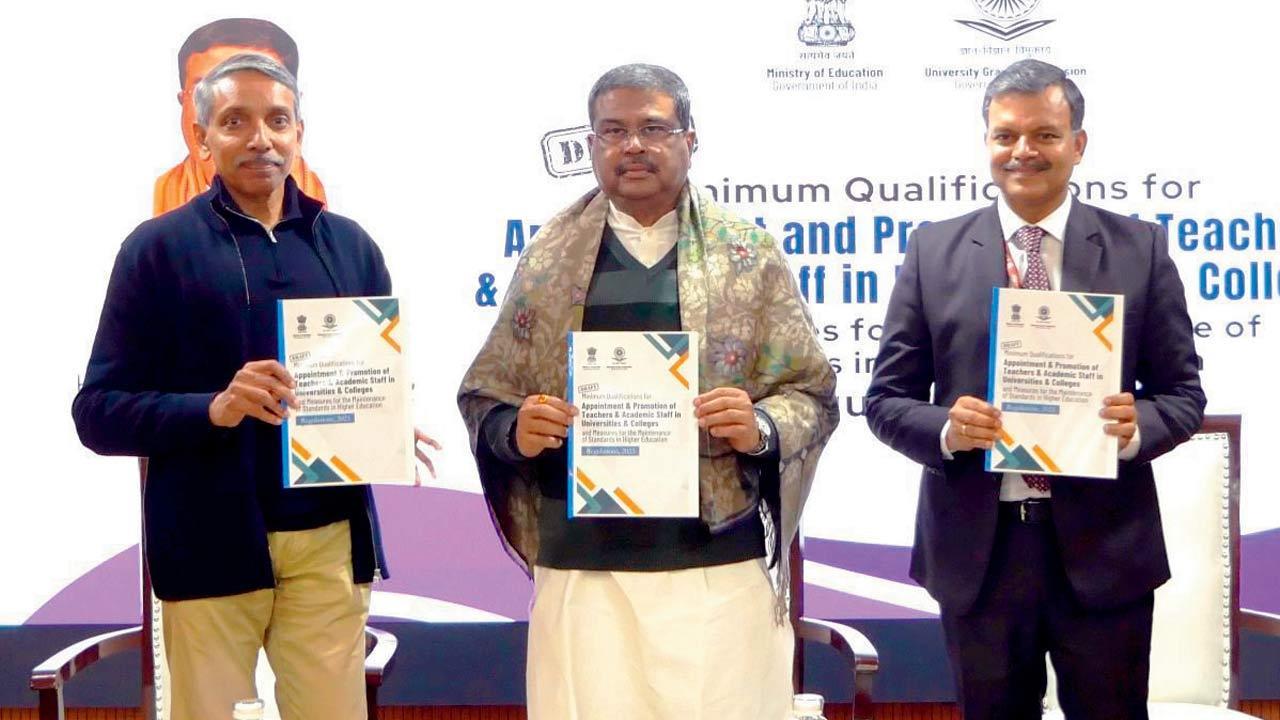Fresh guidelines seek to remove rigidity from eligibility criteria and align university hiring practices with National Education Policy, 2020

Union Education Minister Dharmendra Pradhan (centre) releases the UGC draft, 2025, on Monday. PIC/X/@dpradhanbjp
The University Grants Commission’s (UGC) fresh draft, released by Union Education Minister Dharmendra Pradhan on Monday, proposes that clearing the National Eligibility Test (NET) will no longer be mandatory for appointment as an assistant professor. The guidelines, which cover faculty recruitment and promotions in higher education institutions, aim to remove “rigidity” from the eligibility criteria and align university hiring practices with the National Education Policy (NEP) 2020.
ADVERTISEMENT
The draft regulations also mention a major change in the appointment of vice-chancellors (VCs), effectively giving state governors broader powers in the selection process. As chancellors of state universities, governors would not only have greater control but also the final say in VC appointments. Industry experts, public sector veterans, and senior administrators could also be considered for VC positions, thus breaking the long-held tradition of restricting the role to career academics only.
The new draft regulations, titled ‘University Grants Commission (Minimum Qualifications for Appointment and Promotion of Teachers and Academic Staff in Universities and Colleges and Measures for Maintenance of Standards in Higher Education) Regulations, 2025,’ also remove the cap on contract teacher appointments.
Mixed reactions
A former Mumbai University VC cautioned against granting more power to governors. “Giving more power to governors or chancellors of state universities isn’t necessarily a good idea. In most cases, the governor is not an academician, and vesting too much authority in one person could lead to disagreements over VC appointments. There’s also the risk of corruption and political influence,” the former VC said.
Commenting on the removal of NET as a mandatory requirement, another academician said, “I never appeared for NET, but I became a professor and then VC of Mumbai University. Teaching proficiency, subject knowledge, and a hunger for continuous learning matter more than clearing an exam.” Dr A D Sawant, former pro-VC of Mumbai University, believes the decision to drop the mandatory NET requirement “doesn’t make much difference” as long as a transparent recruitment system is maintained. He noted that “NET was introduced partly to curb malpractices in teacher recruitment,” especially in private universities.
He also expressed concerns over how VC appointments are currently handled in Maharashtra. “The search committee has been reduced to a selection committee, choosing from a list of applicants. It lacks transparency, and we need distinguished educationists with no conflicts of interest. The question is how much of this has actually been followed in the last decade.”
Dr Subhash Athavale, general secretary, Mumbai University College Teachers Association (MUCTA), welcomed the proposal to remove NET as a compulsory criterion. “Teaching is an art, and the NET exam does not adequately measure a candidate’s teaching proficiency, communication skills, or subject knowledge,” Athavale said.
To strengthen hiring practices, Dr Athavale recommended requiring at least two teaching demonstrations, one before a panel of senior faculty members and another before students, beyond the conventional interview. “This feedback system would help identify passionate, knowledgeable educators and reduce corruption or undue influence in the recruitment process,” he explained.
 Subscribe today by clicking the link and stay updated with the latest news!" Click here!
Subscribe today by clicking the link and stay updated with the latest news!" Click here!







